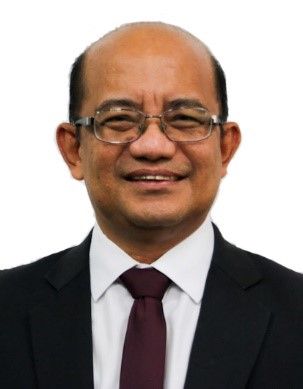Reynaldo V. Ebora • Ph.D., Entomology, Michigan State University (1995); Executive Director, Philippine Council for Agriculture, Aquatic and Natural Resources Research and Development

Throughout Reynaldo V. Ebora’s distinguished career, his exemplary contributions in advancing science, technology and innovation, and senior leadership in the Philippines government and with the University of Philippines have made him an outstanding representative of the Joon S. Moon Distinguished International Alumni Award.
Ebora obtained a Ph.D. in Entomology from Michigan State University after coming to the university in 1990 as a Rockefeller Foundation Fellow, specializing in plant biotechnology and genetic engineering for insect resistance. While at MSU, he attended two international biotechnology, biosafety and technology transfer programs. After returning to the Philippines, Ebora implemented these programs, building the next generation of leaders in biotechnology and biosafety. In his role at Southeast Asia Program for Biosafety Systems, he facilitated the expansion of MSU’s network in the region.
Ebora now serves as the executive director of the Philippine Council for Agriculture, Aquatic and Natural Resources Research and Development of the Department of Science and Technology (DOST-PCAARRD), where he is responsible for leading the Philippine National Agriculture, Aquatic and Natural Resources Research and Development System in the formulation of frameworks, thrusts, and programs for the development of the agriculture, aquatic and natural resources sector of the country.
He previously served as research professor and director of the National Institute of Molecular Biology and Biotechnology-University of the Philippines Los Baños and executive director of the DOST-Philippine Council for Advanced Science and Technology Research and Development. His areas of research and expertise are in entomology, biotechnology, biosafety, research management, intellectual property management and technology transfer.
I pursued my Ph.D. in Entomology in MSU under a Rockefeller Foundation Fellowship and obtained good academic training from the very competent faculty and staff and advanced research facilities. It also gave me an opportunity to interact with other foreign students and researchers from different parts of the world. MSU’s comprehensive academic program and strong research culture definitely contributed to my professional development.
After my graduation, I returned to the Philippines to work as a research assistant professor, and later had the privilege to collaborate with MSU’s Karim Maredia, Ph.D., on biotechnology and biosafety under the Program for Biosafety Systems, a USAID-funded initiative.
What I remember most is MSU’s strong academic and multicultural programs and advanced research facilities. MSU has a very nice and scenic campus, which my family enjoyed during our stay there. MSU also has a very supportive faculty and staff and accommodating community in East Lansing.
Before I pursued my Ph.D., I was a researcher at the University of the Philippines Los Baños-National Institute of Molecular Biology and Biotechnology and had previous training on molecular biology and biotechnology from Japan.
After my Ph.D. work, I further pursued biotechnology research and was involved in the information campaign regarding the safe and responsible use of biotechnology, specifically genetically modified crops. I became involved in biosafety related activities particularly on risk assessment, risk communication, risk management and insect resistance management.
Biotechnology has contributed much to improving the productivity of various sectors, including agriculture. It has provided innovative and novel high quality products and services, which are not possible in conventional technologies. However, just like any other advanced technology, there are also risks associated—which could be addressed by appropriate biosafety practices and policies. Biosafety is necessary for the safe and responsible use of biotechnology.
In all of my professional roles, the institutions I have served in are involved in the development and promotion of technologies and innovation in the country. My accomplishments as a science administrator were made possible by the strong support of my colleagues and co-workers. I’ve just provided the leadership and facilitated the implementation of the different programs—they are the ones who work really hard to attain our objectives and fulfill our institution’s mandates.
MSU further strengthened my academic training previously obtained in the Philippines and Japan. MSU has contributed to my professional development and further exposed me to international collaborations, especially in biotechnology and biosafety. Under the Program for Biosafety Systems where I served as SEAsia coordinator and PBS Philippines coordinator, collaborating with Karim Maredia’s group provided me with a much wider perspective and network. It has also helped me establish collaboration with various local and international partners.
It’s more about the legacy of the institutions I’ve led, rather than my own legacy. The successful implementation of the different programs and projects, especially those involving capacity building, was due to the collective efforts of myself, my colleagues and co-workers. This would not be possible without their full support and the support of our administrators. One of the measures of our success is the ability to provide leadership and be able to help in producing future leaders in the agriculture, aquatic and natural resources sector.
I believe all MSU international alumni are capable of providing effective leadership in their respective sectors and areas of endeavor due to the excellent academic training they received from the university. In pursuing public service roles, they can definitely make a difference by contributing their ideas and talent in nation building through the practice of their professions in their home countries.
Nominated by: Karim M. Maredia, Director of International Programs, College of Agriculture & Natural Resources
The Joon S. Moon Distinguished International Alumni Award recognizes alumni who came to MSU as international students for their outstanding leadership and contributions in or to the international field or international communities, organizations, companies, agencies, individuals, and/or governments.